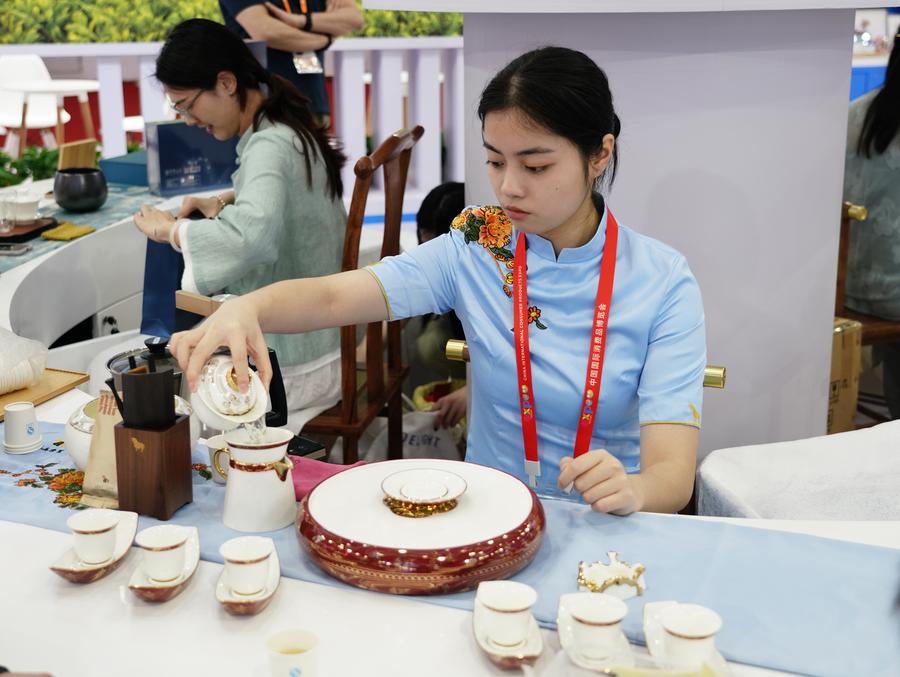An aerial drone photo taken on May 7, 2024 shows workers picking tea leaves at a tea garden in Xingcun Town in Wuyishan City, east China's Fujian Province. (Xinhua/Jiang Kehong)
BEIJING, May 22 (Xinhua) -- Ghanaian student Samuel Aboagye used to start his mornings with a coffee, but since coming to China, he gets his morning fix from a nice cup of tea.
Aboagye first encountered Chinese tea when a Chinese friend gave him a packet of jasmine tea. "The taste and aroma attracted me, and I instantly fell in love with Chinese tea," said Aboagye, an international student at Capital University of Economics and Business.
He was just one of many African visitors to an international tea-culture exchange event held in Beijing on May 21, which is also observed as International Tea Day.
The event was hosted by the international cultural exchange and research center of China Institute for Innovation and Development Strategy (CIIDS), welcoming representatives from social organizations and enterprises, as well as diplomatic envoys from African countries and African students studying in China.
Today, Africa is an important market for Chinese tea. Chinese customs data shows that China exported about 367,542 tonnes of tea in 2023, with an export value of nearly 1.74 million U.S. dollars.
According to the Tea Industry Committee of the China Association for the Promotion of International Agricultural Cooperation, of the top 10 tea-importing countries and regions from China, seven are African countries.
An exhibitor makes tea for visitors at the booth of east China's Fujian Province during the third China International Consumer Products Expo (CICPE) in Haikou, capital city of south China's Hainan Province, on April 10, 2023. (Xinhua/Fan Yuqing)
Aboagye said that the event gave him in-depth knowledge of Chinese tea categories and tea-drinking methods, as well as the history of the tea trade between China and Africa. "I plan to purchase Chinese tea and tea sets for my relatives and friends when I travel back to Ghana," he added.
"Nigerians also like drinking tea, but the tea culture in Nigeria differs from that of China," said Uzodinma Chinenye Gerlof, 28, an international student from Nigeria. "Chinese people enjoy natural tea without adding sugar or milk, while in our country, people are accustomed to adding milk to tea," he explained.
Gerlof combines the Chinese tea-drinking culture with that of his hometown by adding honey to Chinese black tea. "The aroma of tea makes me feel relaxed, and I like to enjoy it in the morning or evening," he said.
"Tea has played an important role in the inheritance and innovation of Chinese culture," said Wang Xiaoming, vice president of CIIDS.
He noted that tea, with its unique charm, has transcended the boundaries of language and region, promoting exchanges and understanding among different civilizations.
"We have found that many tea products feature China-chic packages, and small tea bags have also been developed to cater to the needs of young people, which can also better stimulate African youth's interest in Chinese tea culture," said Zhou Yefan, founder of the China Africa Youth Federation.
"Through drinking tea together, young people from China and Africa can learn about each other's culture, history and values," said Zhou.






 A single purchase
A single purchase









